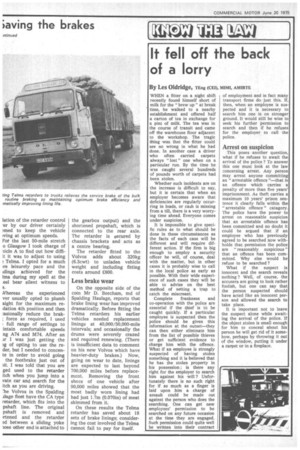It fell off the back of a lorry
Page 68

If you've noticed an error in this article please click here to report it so we can fix it.
By Les Oldridge,
TEng (CE!), MIMI, AIVIIRTE WHEN a fitter on a night shift recently found himself short of milk for the " brew up" at break time, he walked to a nearby establishment and offered half a carton of tea in exchange for a pint of milk. The tea was in the course of transit and came off the warehouse floor adjacent to the workshop. The tragic thing was that the fitter could see no wrong in what he had done. In another case a driver who often carried carpets always "lost" one when on a particular run. By the time he was caught several hundreds of pounds worth of carpets had been stolen.
Whether such incidents are on the increase is difficult to say, but it is certain that when an employer becomes aware that deficiencies are regularly occurring in loads, or cash is missing from a till, there is a very worrying time ahead. Everyone comes under suspicion.
It is impossible to give specific rules as to what should be done in these circumstances as the facts of each case will be different and will require different action. If the firm is big enough to employ a security officer he will, of course, deal with the matter, but in other cases it is probably wise to call in the local police as early as possible. With their wide experience of such cases they will he able to advise on the best method of setting a trap to catch the miscreant.
Complete frankness and co-operation with the police are essential if the thief is to be caught quickly. If a particular employee is suspected then the police should be given this information at the outset—they can then either eliminate him from the list of possible thieves or get sufficient evidence to charge him with the offence. What if an employee is strongly suspected of having stolen something and it is believed that he has the stolen property in his possession ; is there any right for the employer to search him against his will ? Unfortunately there is no such right for if as much as a finger is laid upon him a charge of assault could be made out against the person who does the searching. One can get new employees' permission to be searched on any future occasion at the time they are engaged. Such permission could quite well be written into their contract
of employment and in fact many transport firms do just this. If, then, when an employee is suspected and it is necessary to search him one is on stronger ground. It would still be wise to seek his further permission to search and then if he refuses for the employer to call the police.
Arrest on suspicion
This poses another question, what if he refuses to await the arrival of the police ? To answer this one must look at the law concerning arrest. Any person may arrest anyone committing an " arrestable offence "—that is an offence which carries •a penalty of more than five years' imprisonment. As theft carries a maximum 10 years' prison sentence it clearly falls within the " arrestable offence" catagory. The police have the power to arrest on reasonable suspicion that an arrestable offence has been committed and no doubt it could be argued that if an employee who has previously agreed to be searched now withholds that permission the police are "reasonably, suspicious " that an offence has been committed. Why else would he refuse to be searched ?
What if the suspect is innocent and the search reveals nothing ? Well, of course, the accusers are going to look rather foolish, but one can say that the person suspected should have acted like an innocent person and allowed the search to take place.
It is important not to leave the suspect alone while awaiting the arrival of the police. If the object stolen is small enough for him to conceal about his person he will get rid of it somehow, perhaps by throwing it out of the window, putting it under a Carpet or in a fireplace.




























































































































































